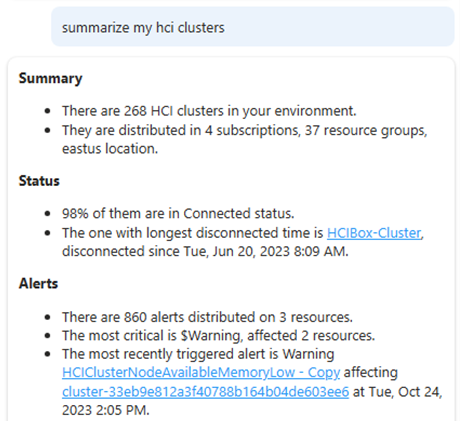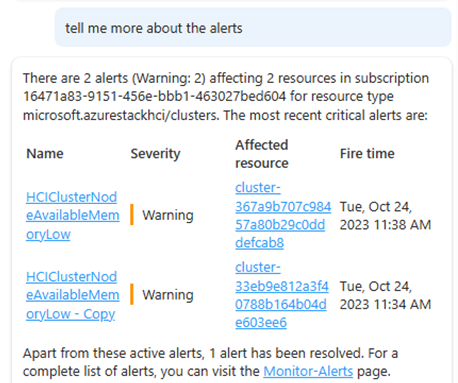Work smarter with your Azure Stack HCI clusters using Microsoft Copilot in Azure
Microsoft Copilot in Azure (preview) can help you identify problems and get information about your Azure Stack HCI clusters.
When you ask Microsoft Copilot in Azure for information about the state of your hybrid infrastructure, it automatically pulls context when possible, based on the current conversation or on the page you're viewing in the Azure portal. If the context of a query isn't clear, you'll be prompted to clarify what you're looking for.
Note
The tasks and sample prompts listed here show a few of the areas where Microsoft Copilot in Azure (preview) can be especially helpful. However, this is not a complete list of all the things you can do. We encourage you to experiment with your own prompts and see how Microsoft Copilot in Azure (preview) can help you manage your Azure resources and environment.
Important
Microsoft Copilot in Azure (preview) is currently in PREVIEW. See the Supplemental Terms of Use for Microsoft Azure Previews for legal terms that apply to Azure features that are in beta, preview, or otherwise not yet released into general availability.
Sample prompts
Here are a few examples of the kinds of prompts you can use to work with your Azure Stack HCI clusters. Modify these prompts based on your real-life scenarios, or try additional prompts to get different types of information.
- "Summarize my HCI clusters"
- "Tell me more about the alerts"
- "Find any anomalies in my HCI clusters"
- "Find any anomalies from the most recent alert"
Examples
In this example, Microsoft Copilot in Azure responds to the prompt "summarize my HCI clusters" with details about the number of clusters, their status, and any alerts that affect them.

If you follow up by asking "tell me more about the alerts", Microsoft Copilot in Azure provides more details about the current alerts.

Next steps
- Explore capabilities of Microsoft Copilot in Azure.
- Learn more about Azure Stack HCI.
Feedback
Coming soon: Throughout 2024 we will be phasing out GitHub Issues as the feedback mechanism for content and replacing it with a new feedback system. For more information see: https://aka.ms/ContentUserFeedback.
Submit and view feedback for